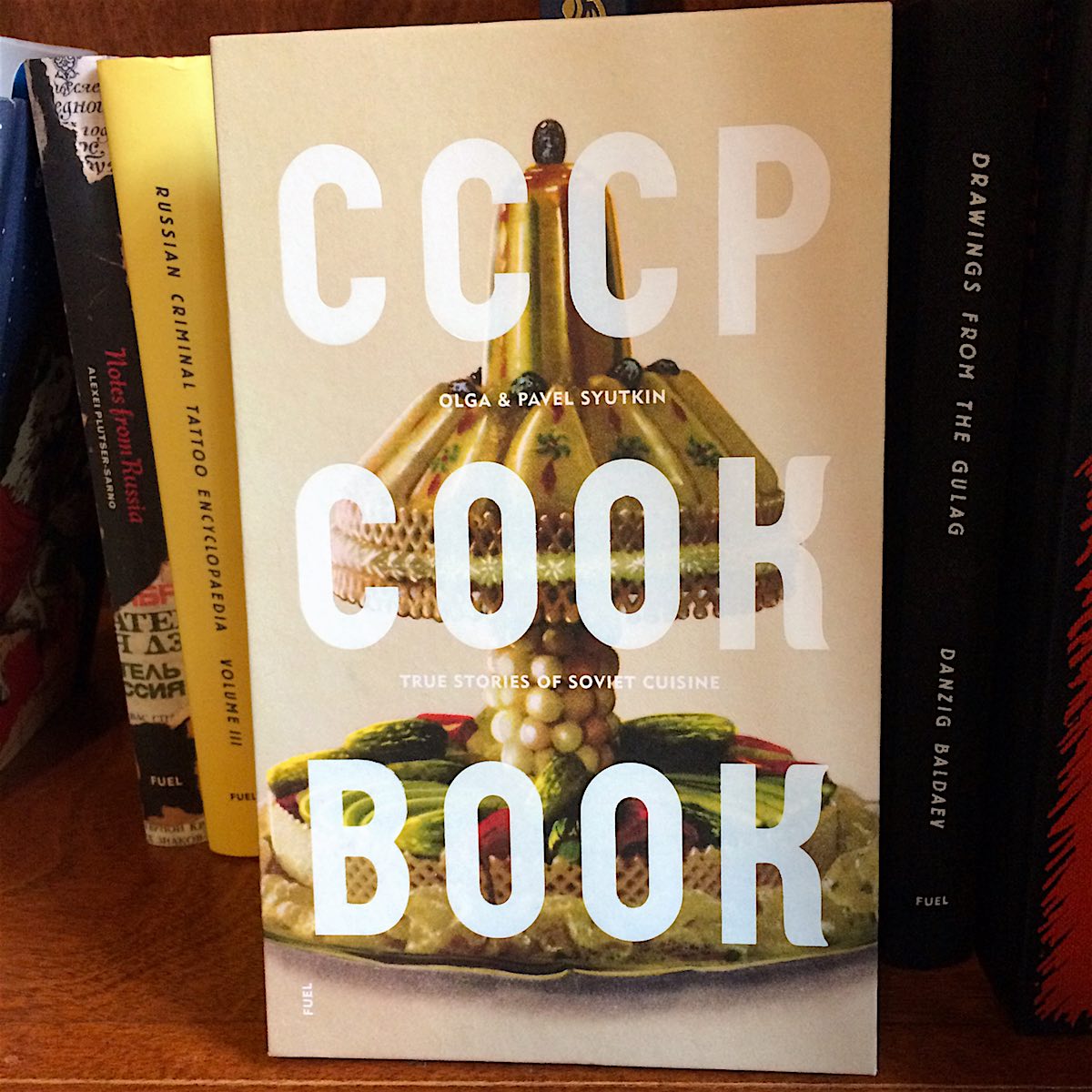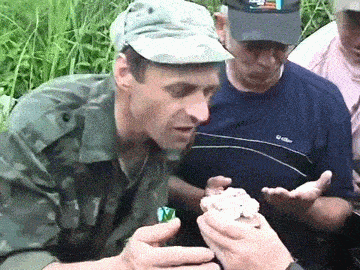Wink /
10:35 am Wed, Apr 6, 2016

See sample pages from this book at Wink.
Fuel Publishing, based in London, has carved a niche in the book world by creating books that document the small dark corners of Soviet history. You may be familiar with the series of books, Russian Criminal Tattoos, that revealed the language of body ink and the hierarchies of gulags. CCCP Cook Book uses the same obsessive attention to detail to great effect.
When your country is wholly dependent on what the obshchina (collective farm) produces, what you eat is a political act. CCCP Cook Book delves deep into the history of dishes beloved by generations of Russians evolved from both the ideal of equal for all and the realities of planned food production in a country of nearly 170 million.
Visually, CCCP Cook Book adheres to Fuel’s high-minded design aesthetic. The full-page photos that illustrate the recipes are faithfully reproduced in the faded colors and garish contrasts that plagued cookbooks (regardless of origin) throughout the mid-century period.
Knowing that “Soviet” in Russian means "assembly" helps understand that Soviet cuisine isn’t necessarily Russian food. Central planners developed recipes based on projected harvests and preserved foods. Fresh herring wasn’t available in Taskent, but tinned (preserved) fish could be distributed throughout the country. Workers were fed meals at their workplaces that helped standardize recipes, as commissary cooks were required to follow the famed manual, “Book of Tasty and Healthy Food.”
That guide purposefully adapted regional dishes into new, improved Soviet recipes. Vorschmack has its roots in Jewish cuisine, but is easily recognized today as our own deviled eggs. Read the rest

According to the uploader's description, these jolly Russian gentlemen here are opening what is identified as a 70-year-old package of Soviet fighter pilot war chow.
Read the rest
Growing up in the United States, I never really heard much about
high-stakes, dead-of-night defections to the Soviet Union. But here's an interesting one: Bruno Pontecorvo, an Italian nuclear physicist who vanished (along with his whole family) while vacationing in Finland in 1951.
Read the rest
Using old Soviet Union techniques, Ukrainian scientists trained dolphins to attack and kill swimmers using knives and guns strapped to the heads of said dolphins. Like you do.
Today, the dolphins escaped. No word on whether they are armed. (Is it just me, or does this sound like the set-up to a cheapo Eastern European "B" horror movie? I'm imagining screaming spring breakers fleeing evil cetaceans. Day of the Dolphin?)
Read the rest
At Grist, Jess Zimmerman has an interesting piece about a lake near a notoriously leaky former Soviet nuclear research site, where the radiation level is so high that an hour on the beach can be enough to kill you.
You can’t really blame Lake Karachay for acting up — it comes from a really rough area. The lake is located within the Mayak Production Association, one of the largest — and leakiest — nuclear facilities in Russia. The Russian government kept Mayak entirely secret until 1990, and it spent that period of invisibility mainly having nuclear meltdowns and dumping waste into the river. By the time Mayak’s existence was officially acknowledged, there had been a 21 percent increase in cancer incidence, a 25 percent increase in birth defects, and a 41 percent increase in leukemia in the surrounding region of Chelyabinsk. The Techa river, which provided water to nearby villages, was so contaminated that up to 65 percent of locals fell ill with radiation sickness — which the doctors termed “special disease,” because as long as the facility was secret, they weren’t allowed to mention radiation in their diagnoses.
Read the rest at Grist Read the rest
I love rediscovering cool things. I'm sure I learned, at some point, that the Soviet Union had once sent probes to land on the surface of Venus. But I had completely forgotten this fact until today.
This photo comes from Venera 9, which landed on Venus on October 22, 1975. The lander remained operational for 53 minutes, which isn't bad considering we're talking about a planet with hydrochloric acid and hydrofluoric acid in the atmosphere, and a surface temperature (as measured by Venera 9) of 905° F.
The photo — at three different phases of processing — comes from the website of Don Mitchell, an enthusiast of Soviet space history. Mitchell did the processing that resulted in the clear, bottom image in this stack.
The upper image is the raw 6-bit data. The center images include the telemetry brust replacements, with remaining bursts blacked out. The 6-bit values have been transformed to linear brightness, using the published photometric function of the camera, and then converted to sRGB standard form (gamma 2.2). In the final version, I filled in missing regions, using Bertalmio's inpainting algorithm.
• Read more about these photos at Don Mitchell's website
• Read more about the Venera landers and how they survived on Venus
Thanks to OMG Facts for reminding me of this cool bit of history
Read the rest
People walk past graffiti on a street in the Georgian capital Tbilisi, Jan. 13, 2012. (REUTERS)
Editor's Note: In response to an anonymously-sourced wisecrack we published about police corruption in former Soviet states, the Georgian Ministry of Internal Affairs responded with a statement, which we published in full. A Boing Boing reader from Georgia also asked to respond to the anonymously-sourced wisecrack, with which he takes issue. Like the wisecracker, this person requests anonymity.
The police in Georgia are definitely not fat or lazy. They are not corrupt on the street level, either. But the whole system still retains elements of corruption (in enforcement, in the judiciary, and in the legislative realm). The problem lies more in the definition of corruption: the fact that you can no longer bribe the policeman in the streets or at the sovereign borders does not mean everything is crystal-clean.
The fact that citizens are still afraid of police in Georgia as if they were monsters is still an expression of the damage of corruption. The fact that you can be imprisoned for smoking pot weeks before actually being tested by cops (because you might seem suspicious to them, not because you've been caught smoking pot) is a kind of corruption, I believe.
There is a terrible feeling of vulnerability in Georgia. Police are still used as a tool to terrorize people and make money, but these days, paying bribes to individual policemen is no longer normal.
Georgian policemen stand to attention during a daily shift change at the Interior Ministry in Tbilisi, Jan. Read the rest
Editor's Note: In response to an anonymously-sourced wisecrack we published about police corruption in former Soviet states, the Georgian Ministry of Internal Affairs has responded with a statement, which we are more than happy to publish in full.
Georgian Police: Model for Successful Transformation
The article published on [Boing Boing on] January 12, 2012, about the initiative by the Ministry of Internal Affairs of Georgia to introduce new portable field computers (so called “Police Pads”) ends with an anonymous quote declaring that "100% guaranteed those crooked, fat, lazy cops will be using these devices primarily for porn and Russian gambling services."
Stereotypes like this are easy to toss out—but are quite simply incorrect. This quote does not reflect the productivity, effectiveness, transparency, and reliability of the police force in Georgia today, but rather the bygone era of the 1990s, a reality that has drastically changed thanks to an ambitious and successful reform process.
The reform process in Georgia began immediately after the 2003 Rose Revolution. The new government inherited a completely corrupt and bloated law-enforcement system. The systemic corruption and the high level of crime throughout the country resulted in a very low level of public trust: fewer than 10% of Georgians had confidence in the police, according to 2003 polls. And the very low average policeman's salary (approximately $68 per month) made the soliciting of bribes routine.
Georgia has since made the creation of an efficient and modern police force a national priority, undertaking a series of reforms that sought to rebuild the national police force literally from the ground up. Read the rest


